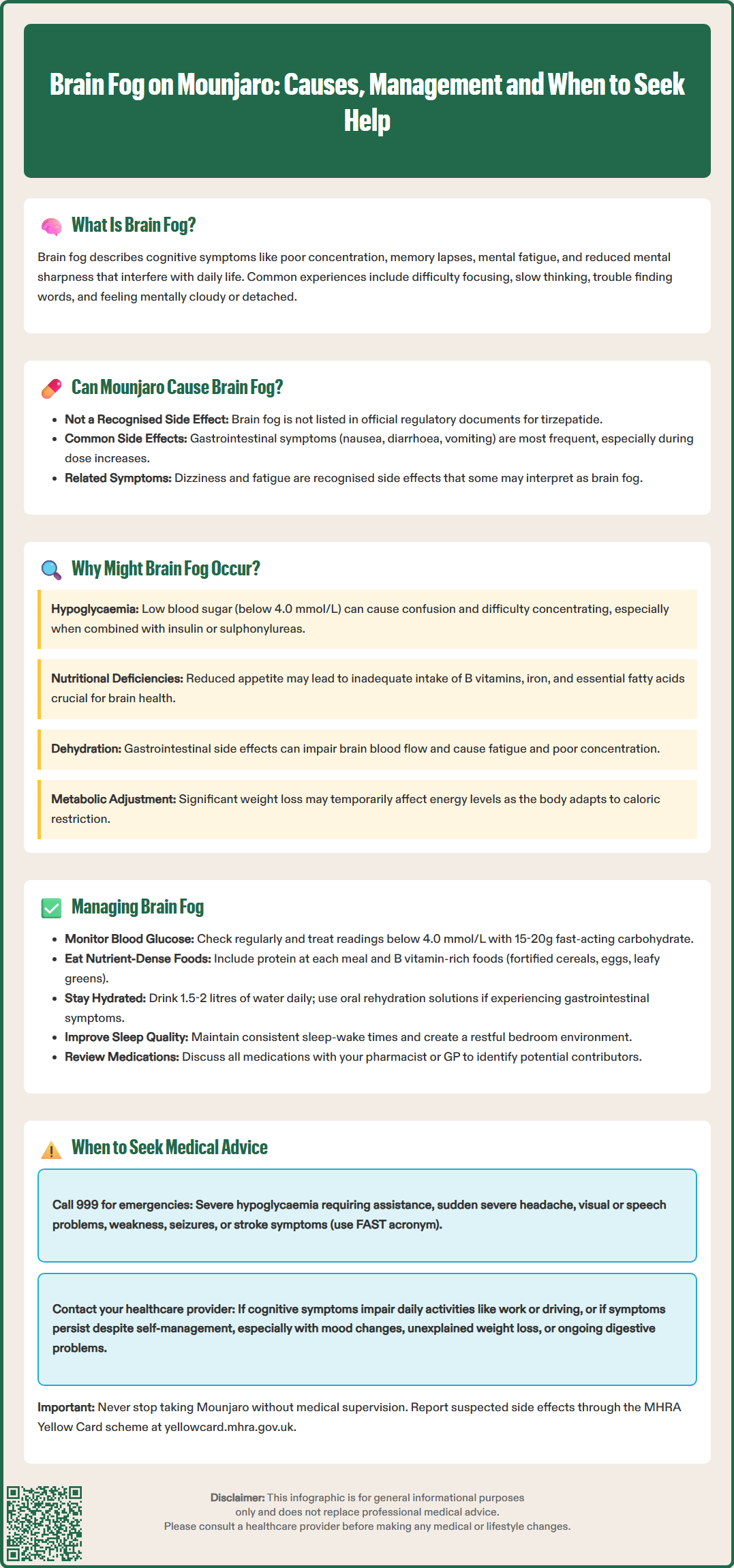
Brain fog whilst taking Mounjaro (tirzepatide) is a concern reported by some patients, though it is not listed as a recognised adverse effect in the Summary of Product Characteristics. Cognitive symptoms such as difficulty concentrating, memory lapses, and mental fatigue may arise from indirect mechanisms including hypoglycaemia, nutritional deficiencies, dehydration, or metabolic adjustment during treatment. Understanding potential contributing factors and implementing appropriate management strategies can help address these symptoms. This article examines the relationship between Mounjaro and brain fog, explores possible underlying causes, and provides guidance on when to seek medical advice.
Quick Answer: Brain fog is not a recognised adverse effect of Mounjaro (tirzepatide), but cognitive symptoms may occur through indirect mechanisms such as hypoglycaemia, nutritional deficiencies, or dehydration.

Mounjaro® is the most innovative GLP-1 medication proven to dramatically curb appetite, hunger, and cravings to help professional men achieve substantial weight loss.
Start Here
Wegovy® is a weekly injectable GLP-1 medication with proven effectiveness in reducing appetite, hunger, and cravings to help busy professionals lose significant weight.
Start HereBrain fog is not a medical diagnosis but rather a descriptive term used by patients to characterise a constellation of cognitive symptoms that affect mental clarity and function. It encompasses difficulties with concentration, memory lapses, reduced mental sharpness, and a general sense of cognitive sluggishness that can significantly impact daily activities and quality of life.
Individuals experiencing brain fog commonly report:
Difficulty concentrating or maintaining focus on tasks
Memory problems, particularly with short-term recall
Mental fatigue and reduced processing speed
Confusion or difficulty finding the right words
A sensation of mental 'cloudiness' or detachment
The subjective nature of brain fog makes it challenging to quantify, and its severity can fluctuate throughout the day. Some people describe it as feeling as though they are thinking through a haze, whilst others report a persistent sense of mental exhaustion that does not improve with rest. The impact on work performance, social interactions, and routine decision-making can be considerable.
Brain fog can arise from numerous underlying causes, including sleep deprivation, certain nutritional deficiencies, hormonal changes, chronic stress, medications, and metabolic disturbances such as hypoglycaemia. Neurological conditions, autoimmune disorders, post-viral syndromes (including long COVID), obstructive sleep apnoea, and mental health conditions like depression and anxiety may also manifest with cognitive symptoms.
Importantly, brain fog should be distinguished from acute confusion or delirium, which has a sudden onset and represents a medical emergency requiring immediate assessment. Because brain fog is a non-specific symptom, identifying the underlying cause requires careful clinical assessment and consideration of the patient's overall health status, medication history, and recent lifestyle changes.

Mounjaro (tirzepatide) is a dual glucose-dependent insulinotropic polypeptide (GIP) and glucagon-like peptide-1 (GLP-1) receptor agonist licensed in the UK for the treatment of type 2 diabetes mellitus. For weight management, tirzepatide is available under the brand name Zepbound for adults with obesity or overweight with weight-related comorbidities, with its own distinct Summary of Product Characteristics (SmPC) and NICE criteria.
Currently, brain fog is not listed as a recognised adverse effect in the SmPC for Mounjaro as approved by the Medicines and Healthcare products Regulatory Agency (MHRA) or the European Medicines Agency (EMA). The most commonly reported adverse effects in clinical trials include gastrointestinal symptoms such as nausea, diarrhoea, vomiting, constipation, and abdominal discomfort, which occur in a significant proportion of patients, particularly during dose escalation.
Whilst brain fog specifically is not listed, the SmPC does note that dizziness and fatigue are recognised adverse effects, which some patients might experience or describe as cognitive dulling or brain fog. Anecdotal reports from patients using tirzepatide have included descriptions of cognitive symptoms consistent with brain fog. It is important to emphasise that there is no official link established between tirzepatide and cognitive impairment based on current clinical trial data and post-marketing surveillance.
Clinicians should maintain a balanced perspective: whilst brain fog is not a documented side effect of Mounjaro, patient-reported symptoms warrant thorough investigation to identify potential contributing factors, whether related to the medication, the underlying condition being treated, or concurrent health issues.
If you experience symptoms you believe may be related to your medication, you can report suspected adverse drug reactions via the MHRA Yellow Card scheme (yellowcard.mhra.gov.uk).
Although there is no established causal relationship between Mounjaro and brain fog, several indirect mechanisms may explain why some patients report cognitive symptoms whilst taking this medication. Understanding these potential pathways is crucial for appropriate clinical management.
Hypoglycaemia represents one plausible mechanism, particularly in patients taking Mounjaro alongside other glucose-lowering medications such as sulphonylureas or insulin. When used alone, tirzepatide has a relatively low risk of hypoglycaemia due to its glucose-dependent action. However, when combined with insulin or sulphonylureas, the risk increases significantly. Even mild hypoglycaemia (blood glucose <4.0 mmol/L) can manifest as confusion, difficulty concentrating, and mental sluggishness—symptoms that closely mirror brain fog. Patients may not always recognise these episodes as hypoglycaemic events, especially if they are asymptomatic or occur during sleep. Missed meals or alcohol consumption can further increase this risk.
Inadequate nutritional intake may develop secondary to the significant appetite suppression and reduced caloric intake associated with GLP-1 receptor agonist therapy. Patients often experience early satiety and decreased interest in food, which could potentially lead to reduced intake of essential nutrients including:
B vitamins, particularly B12 (which can also be affected by long-term metformin use)
Iron, necessary for oxygen transport and cognitive performance
Essential fatty acids important for brain health
Dehydration is another consideration, as gastrointestinal adverse effects—particularly nausea, vomiting, and diarrhoea—can lead to fluid and electrolyte imbalances. Dehydration affects cerebral perfusion and can produce symptoms of fatigue, poor concentration, and cognitive dulling.
Additionally, some patients report a period of metabolic adjustment during significant weight loss that may temporarily affect energy levels and, potentially, cognitive function. As the body adapts to caloric restriction and metabolic changes, some individuals experience a transitional period where they may feel less mentally sharp. This typically resolves as metabolic homeostasis is re-established.
If you are experiencing brain fog whilst taking Mounjaro, several practical strategies may help alleviate symptoms whilst you work with your healthcare team to identify and address underlying causes.
Monitor blood glucose levels regularly, particularly if you are taking other diabetes medications. Keep a symptom diary noting when cognitive difficulties occur in relation to meals, medication timing, and glucose readings. If your blood glucose is below 4.0 mmol/L (hypoglycaemia), treat with 15-20g of fast-acting carbohydrate (e.g., glucose tablets, fruit juice), recheck after 15 minutes, and follow with a longer-acting carbohydrate if needed. If you suspect recurrent hypoglycaemia, discuss with your GP or diabetes specialist nurse whether medication adjustments are needed. Never alter your diabetes medication regimen without professional guidance.
Optimise nutrition despite reduced appetite:
Prioritise nutrient-dense foods even in smaller portions
Include protein sources at each meal (discuss appropriate targets with your healthcare provider, especially if you have kidney disease)
Include foods rich in B vitamins (fortified cereals, eggs, leafy greens, legumes)
Consider a multivitamin supplement after discussing with your pharmacist or GP
Maintain regular meal patterns to stabilise blood glucose
Stay well-hydrated by sipping water throughout the day, aiming for at least 1.5–2 litres daily unless otherwise advised. If experiencing gastrointestinal symptoms, oral rehydration solutions may be beneficial.
Prioritise sleep hygiene as poor sleep quality exacerbates cognitive symptoms. Establish consistent sleep-wake times, create a restful bedroom environment, and limit screen exposure before bed.
Manage stress through evidence-based techniques such as mindfulness, gentle physical activity (as tolerated), and maintaining social connections. Chronic stress significantly impairs cognitive function and may compound medication-related effects.
Review all medications with your pharmacist or GP, as polypharmacy can contribute to cognitive symptoms. Some commonly prescribed medications—including certain antihistamines, antidepressants, and pain medications—may cause or worsen brain fog.
If symptoms persist despite these measures, request a comprehensive review including thyroid function tests, vitamin B12, folate and ferritin levels, full blood count, HbA1c, electrolytes, liver function, and renal function, as these investigations may identify treatable causes of cognitive impairment. Vitamin D levels may also be considered if deficiency is suspected.
Whilst mild, transient cognitive changes may occur during medication initiation or dose escalation, certain red flag symptoms warrant prompt medical assessment. You should contact your GP or healthcare provider if you experience:
Severe or worsening cognitive symptoms that significantly impair your ability to work, drive safely, or perform daily activities. Sudden deterioration in mental function requires urgent evaluation to exclude serious underlying conditions.
Symptoms suggestive of hypoglycaemia (blood glucose <4.0 mmol/L), including:
Confusion, difficulty speaking, or unusual behaviour
Tremor, sweating, or palpitations
Recurrent episodes of feeling faint or dizzy
Cognitive symptoms that improve after eating
If you experience severe hypoglycaemia (requiring assistance from others), this constitutes a medical emergency requiring immediate attention (call 999) and subsequent medication review.
Neurological warning signs such as:
Severe headache, particularly if sudden onset or different from usual patterns
Visual disturbances or speech difficulties
Weakness, numbness, or coordination problems
Seizures or loss of consciousness
For stroke symptoms, remember the FAST acronym (Face, Arms, Speech, Time) and call 999 immediately. These symptoms may indicate serious conditions unrelated to Mounjaro but requiring urgent investigation.
Persistent symptoms that do not improve with the management strategies outlined above, or cognitive changes accompanied by:
Significant mood changes, particularly low mood or anxiety
Unexplained weight loss beyond expected therapeutic effect
Persistent gastrointestinal symptoms affecting nutritional intake
Signs of dehydration (dark urine, dizziness, reduced urine output)
If you are unsure about the urgency of your symptoms, contact NHS 111 for advice.
Before any consultation, prepare a detailed account of your symptoms including onset, duration, severity, and any patterns you have noticed. Bring a list of all medications (including over-the-counter products and supplements), and note any recent changes to your health or lifestyle. Your healthcare provider may recommend blood tests, medication adjustments, or referral to specialist services depending on clinical findings. Never discontinue Mounjaro without medical supervision, as abrupt cessation may affect diabetes control or weight management goals.
Remember to report any suspected adverse effects to the MHRA through the Yellow Card scheme (yellowcard.mhra.gov.uk).
No, brain fog is not listed as a recognised adverse effect in the Summary of Product Characteristics for Mounjaro (tirzepatide) as approved by the MHRA or EMA. However, dizziness and fatigue are documented adverse effects that some patients may experience as cognitive dulling.
Yes, hypoglycaemia (blood glucose below 4.0 mmol/L) can cause confusion, difficulty concentrating, and mental sluggishness resembling brain fog. This risk increases when Mounjaro is combined with insulin or sulphonylureas, though tirzepatide alone has relatively low hypoglycaemia risk due to its glucose-dependent action.
Contact your GP if you experience severe cognitive impairment affecting daily activities, recurrent hypoglycaemia symptoms, neurological warning signs (severe headache, visual disturbances, weakness), or persistent symptoms that do not improve with management strategies such as optimised nutrition and hydration.
All medical content on this blog is created based on reputable, evidence-based sources and reviewed regularly for accuracy and relevance. While we strive to keep content up to date with the latest research and clinical guidelines, it is intended for general informational purposes only.
DisclaimerThis content is not a substitute for professional medical advice, diagnosis, or treatment. Always consult a qualified healthcare professional with any medical questions or concerns. Use of the information is at your own risk, and we are not responsible for any consequences resulting from its use.